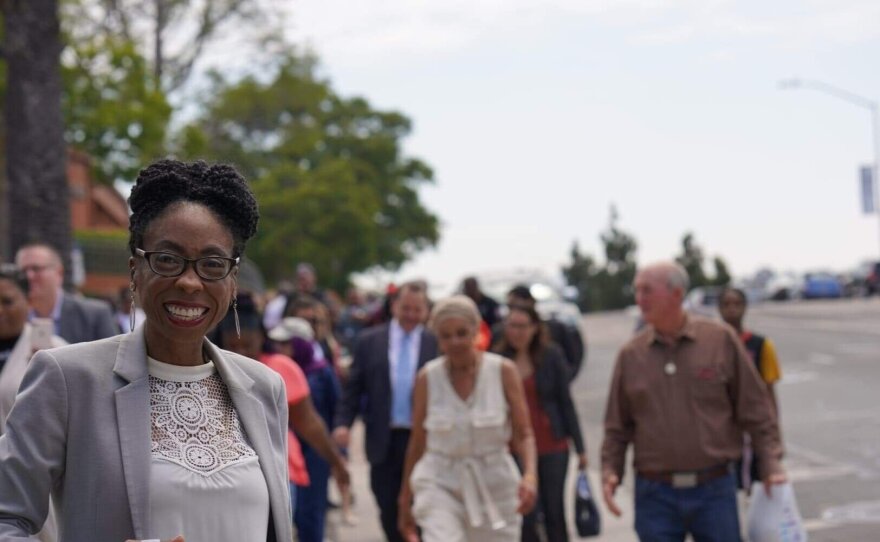Editor's note: Read interviews with other District 4 County Supervisor candidates Janessa Goldbeck and Amy Reichert.
The race is on for the San Diego County Board of Supervisors District 4 seat. The district includes parts of central and Southeast San Diego, La Mesa, Lemon Grove and Spring Valley. Voters can cast their ballot through Aug. 15. In-person vote centers will open their doors on Aug. 5. If no candidate receives more than 50% of the vote, the top two candidates will move on to a runoff election in November.
Monica Montgomery Steppe currently serves as San Diego City Council president pro tempore and has represented San Diego City Council District 4 since 2018.
Montgomery Steppe is endorsed by the San Diego County Democratic Party and several local labor unions.
The following conversation has been edited and condensed for clarity.
Why are you running for the District 4 county seat?
Montgomery Steppe: So this is a very, very important seat for the county. I think that my track record of serving people and bringing the people's voice to City Hall can be seen on a broader scale. It's very important that we continue to center the voice of the people in our residents who live here, who are experiencing housing costs rise and experiencing and seeing our unhouse(d) neighbors on the street and really experiencing the economic situation that we're in right now in the city of San Diego. So I think that it's a prime time to broaden that type of leadership and I think, you know, I'm ready for it.
So you mentioned a couple of things, but, if elected, what would your highest priorities as county supervisor be?
Montgomery Steppe: Well, my highest priorities will be housing and homelessness. The county really has an infrastructure to deal with homelessness in a holistic way. They have behavioral health services, mental health services, family resources; in addition, they have resources for military and and veterans. They also, you know, have resources for folks that are coming out of our criminal legal system. It really is the place where our most vulnerable people are served, and that will absolutely be my top priority. In addition, housing — we really can't go anywhere without hearing the burden and the strain that housing costs are having on everyday San Diegans. And so there have been, you know, solutions put forward. It's particularly for the unincorporated areas in the county which is where, you know, as a supervisor, I would have the jurisdiction, the land-use jurisdiction over. So that certainly will be my top priority, but I will say that when we look at these issues holistically and not work in silos, then that's when we, I believe, can solve the problems. Collaboration is key. (I'm) the only person in this race really that (has) had an opportunity to understand the way that local government works, and bringing that experience to this seat is what really is going to make the difference as we tackle some of the crises that we face in our county.
And these are chronic issues that you mentioned. So how would you get enough support and cooperation behind those priorities to make meaningful solutions actually happen?
Montgomery Steppe: I believe that we should champion partnerships with our community college districts and universities to, you know, subsidize tuition for students who want to enter into this space as outreach workers or into our behavioral health spaces. We have to work to increase the wages in these sectors to have more people enter the industry. We have to streamline how we build housing, certainly. But these are solutions that many, many people can come to the table with, and I just really believe that we have a responsibility to spend taxpayer dollars wisely. We have a responsibility to look at the current systems that we have and make them better so that people do not fall through the cracks. The support, I think, will be there. It's just we have to do the work. This requires more than sort of a shallow approach to the problem. We have to address and acknowledge that there are some deeper issues that impact the entirety of the system that is causing homelessness, and we have to tackle those things one by one.
What can the residents of District 4 expect from your leadership?
Montgomery Steppe: You know, I am the only candidate that has had to take votes and stand on them. So I do have a track record. I have a track record for building out a community governance model that we use to make sure that the policies that we pass have a robust amount of community input. I, you know, have a track record of showing where I stand on various issues: interactions with the criminal legal system, on housing, on homelessness and how we tackle the issues and the problems by providing more resources to people and making sure that everyone who wants help can certainly receive it. Those are the things that I stand on, and I have track record for it. You know, at the city I was able to shepherd the council through our budget process. We have a $5.2 billion budget where we decide what resources go where and that budget process and the decisions that we made were very diverse and reflected the entirety of our communities. And so, you know, this is the type of leadership that I would bring: be strong, be experienced, a proven track record for hearing people, stakeholders across the board. This is what I'm about, and I will continue in that leadership style.
What would you do as supervisor to repair the trust with constituents in the wake of previous supervisor Nathan Fletcher scandal?
Montgomery Steppe: Back in 2018, I ran a campaign for City Council that did not have a whole lot of institutional support, although I did have two unions support me in that race. One was SEIU Local 221, (which) is now supporting ... the majority of county workers, you know, of course, along with the United Domestic Workers. And also I have the National Union of Health Care Workers support me during that race. I bring that race up in this context of building trust with community, because that is the reason why I ran in the first place. I ran in 2018 because there was a need. People did not feel heard, they did not feel seen, and the things they were experiencing, they felt, were not being brought up to the halls of power. This is why I do what I do. ... I'm running for this seat, and I ran for the City Council seat to restore that trust in government because I believe that, you know, people have a right to have their voices heard and folks have really, really good ideas that we should incorporate and move through the bureaucracy so that we can continue to serve people and we can continue to see the results and everyone, you know, can have ownership over not only the problems but the solutions.
As you've mentioned, you've been involved and as a leader in San Diego city government for several years now. You were first elected to the City Council in 2018. Would your approach to governing at the county level be different than governing at the city level?
Montgomery Steppe: Well, the county, of course, has a much larger budget. It's an $8.1 billion budget. It does have different systems that, you know, it has jurisdiction over, like Health and Human Services, like the Sheriff's Department, the jails, Behavioral Health Services, Aging and Independent Services, foster care, and that is much different from the city, you know, where we have Police Department and Fire Department and, you know, Parks and Recreation and we make a lot more land-use decisions right within the city of San Diego. So it's a much larger and more broad governmental entity that would require leadership, you know; that is not different. My style will be the same, but that is enhanced and that has to evolve with the type of systems that I will essentially be making decisions about. But my community-governance model stays the same. My desire to hear from the people as we make these decisions, that stays the same. And so I am looking forward to taking that approach to the county and continuing to center the voice of the people.
And you mentioned the importance of collaboration earlier. What would you do to increase the level of cooperation between the various cities in the county, especially when it comes to homelessness?
Montgomery Steppe: This new leadership is doing so much better with communicating with the cities, including, you know, and of course the city of San Diego, but cities throughout the entire county. So I believe we need to acknowledge that because, five to seven years ago, that absolutely was not the case. We saw that, you know, early on with the Hep. A outbreak and the like, so we are doing a lot more collaboration, but I think that it can go even further and the collaboration can improve even more especially around the issues of housing and of homelessness. We need to communicate at the level of elected officials. But we also have to communicate at the staff level. And I would be in in a position to facilitate those conversations. I know that where some of those gaps exist right now and we have Care Court coming up and it's going to be very important for the county to collaborate with our City Attorney's office, for example in building out the care court that has to do with conservatorship that you know, we are now mandated to do based on state law. And so I have experience and understand the importance and the need for that type of collaboration not only at the elected official level, but at the staff level and I'll be well equipped to facilitate those conversations.
Deaths in San Diego County jails have been among the highest in the state. How would you address that issue?
Montgomery Steppe: I have continued to fight to make our criminal legal system more fair. That will always be a large component of my leadership. Accountability is key for law enforcement officials, for elected officials ... and everyone in between. That is just something that we all should hold true to because accountability is what allows for trust in our system in it. It is what allows our system to work. I came out very early saying that, you know, the Board of Supervisors needs to have more of a say as to, you know, what goes on in the jails, right? And I know that there are limitations by law. Some of those laws are changing at the state level. I support changing those laws so that the Board of Supervisors can have more oversight over the jails right now. But there are also issues within the jail of folks being understaffed and not seeing the wage increases that they need to see in order to do their work. And so we have to tackle this issue in a number of different ways. But there is a reason why police officers unions are attacking me right now — it's because I believe in accountability, and it's important when we talk about the jail deaths. We see the relationship between folks being held accountable and the death rate that we see in our jails, which is one of the highest in the entire state of California.
And, finally, what makes your vision and approach to governing different from the other candidates running for this seat?
Montgomery Steppe: The difference is very clear. ... I have a proven track record, and, when you become an elected official, there are many decisions that I have had to make. And, throughout these five years, I have stayed true to my core values and that means a lot, when we run for office or even seek higher office, that the reputation remains. Many of the same people that supported me in 2018 support me now. My core values have not wavered despite me having the power that a City Council seat brings. That has to count for something. A proven track record has to count for something. Me being able to still be independent and thoughtful in my choices and not being swayed one way or the other based on my core values — it means something in this race. The second thing is: Bureaucracy is tough, even for the smartest of people. And I understand how to move policy through this bureaucracy and to make it work for the people in the way that it was intended to. I'm really excited about the opportunity that is ahead, and I am hopeful that I will be able to serve this county in that District 4 supervisor's seat.








